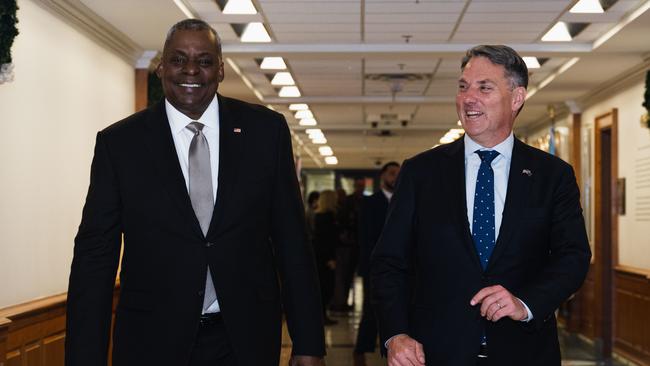Richard Marles rules out Australian base for US nuclear subs
Richard Marles greenlights greater US military presence in Australia but appears to rule out allowing nuclear sub to be based here.

Defence Minister Richard Marles has greenlit greater US military presence in Australia as the two nations seek to integrate and enhance their defence forces in the face of the growing Chinese threat, but appeared to rule out allowing US nuclear powered submarines to be based in Australia until the navy can acquire its own.
Mr Marles, fresh from inspecting a nuclear submarine manufacturing yard in New England, was welcomed to the Pentagon on Monday (Tuesday AEDT) by US Defence Secretary Lloyd Austin ahead of the Albanese government’s first AUSMIN defence and foreign policy talks with the US.
“The trajectory of the American presence in Australia has been growing … and that’s what we would anticipate,” Mr Marles told The Herald Sun in an interview ahead of the minister’s arrival in Washington, adding that permanent basing of US submarines in Australia was “not the answer”.
Australia faces a capability gap of some years as its current fleet of conventionally powered Collins class submarines become obsolete ahead of the arrival of nuclear-powered submarines, promised to Australia as part of the AUKUS security pact with the UK and US, some time after the mid 2030s.
Together with Foreign Minister Penny Wong the two ministers will put their stamp on the nation’s most important bilateral relationship, in face-to-face meetings with US Secretary of State Anthony Blinken and Mr Austin experts hope will usher in greater sharing of advanced technology between the two nations.
“Almost everything should be on the table with Australia, we need to make it far less complicated,” said Elbridge Colby, a former senior Trump administration defence official, pointing to a slew of arcane regulations that prevent advanced US defence technology being shared with Australia.
“The key will be to create economies of scale, not only with submarines, but across the whole defence technology side,” he told The Australian.
The high level meetings are set to take place in a week Congress is expected to pass, for the first time, legislation to support the AUKUS security pact as part of a large defence spending bill.
US congressman Joe Courtney, who has drafted legislation to allow Australian sailors to train on US nuclear submarines, said Mr Marles’s visit to the Electric Boat shipyard “built on a steady stream of visitors from the Australian government and the Australian Navy”.
“It’s a good sign that the US navy and Biden Administration are vigorously following up on the announcement of this extraordinary agreement,” he told The Australian, adding that he was “looking forward to 2023 when laying out the road map for AUKUS execution will really take place”.
In addition to the AUSMIN meeting on Tuesday, Marles and his UK and US counterparts will hold their first AUKUS trilateral meeting on Wednesday, also in Washington, where details of Australia’s path to acquire the nuclear power submarines, which could rest on UK or US designs, are likely to be thrashed out.
The details are likely to remain secret until next year, when the government has promised to release a major defence policy review including details of the path to acquire the eight nuclear powered submarines.
“There’s a bunch of regulatory measures that interrupt the ability of US and Australian to work together as effectively as they should,” said Richard Fontaine, director of the Centre for New American Security, singling out quantum computing.
Charles Edel, the Australia Chair at the Centre for Strategic and International Studies, said there was a “tremendous reservoir of goodwill” in the US congress and administration to ensure the safe transfer of advanced technology to Australia.
“There has been an assessment at highest political level that the US will do something that’s not done in 40 years which is share our most sensitive technology in order to enhance Australia’s defence capabilities,” he told The Australian.
From Washington the ministers will fly to Tokyo for talks with their Japanese counterparts.




To join the conversation, please log in. Don't have an account? Register
Join the conversation, you are commenting as Logout